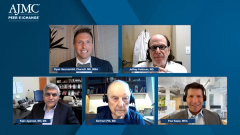
Recognizing the Economic Burden of CKD
Paul Sapia, MHA, explains the economic burden of treating chronic kidney disease.
Episodes in this series

Ryan Haumschild, PharmD, MS, MBA: I want to talk about the economic burden. Paul, I’m going to look to you first. What are some of the economic burdens that you see associated with CKD [chronic kidney disease]? You hit on these earlier. How do they change as the disease progresses? Talk about some of the key drivers of cost or health care resource utilization in this patient population that, as a payer, you’re always considering as you design the benefit.
Paul Sapia, MHA: Absolutely. We all talked about the social determinants of health. Those are the big drivers of this. As a person gets more sick and has more comorbidities, the economic impact continues to drive forward, not only for the payers but also for the members themselves and their families. [It effects] things like co-pays and coinsurance, as well as the social cost on their physical happiness and well-being. That’s a huge burden that we’ve touched on. We need to make sure that we’re starting to approach these in a more proactive way. We talk about patients, but we also need to think about where those patients come from and those communities.
As the economic burden of chronic health care continues to increase over the years, how do we change as a health care system to start thinking more about prevention instead of reaction? A lot of what we have talked about is transitioning from being a payer with aspects of well-being and wellness to more of a well-being and wellness company with aspects of being a payer. We’re starting to address those concerns because it’s unsustainable for us to continue to pay for dialysis and chronic kidney disease as a country, not just Humana.
We need to make sure we’re starting to look at preventive factors and health behaviors, and promoting that at early stages. [We also need to] look at children and their behaviors, and zip codes. We’ve gotten involved with the Florida Prosperity Project with the Florida Chamber of Commerce Foundation, where they’re asking companies to adopt the most impoverished zip codes in the state and start to look at things like housing, food insecurity, mentoring, and literacy rates, and start to change on that end. Because if we start to proactively think about how to address communities most in poverty, we can begin to affect the health care spending, not immediately but further down the road.
There’s a burden on the payers and the providers as patients become more sick. There’s a burden on their families and caregivers as they continue to get more sick. There’s a burden on the communities, municipalities, and cities because they’re dealing with more people who may or may not have insurance and are starting to get caught up in safety net hospitals at end stages. We need to start to look at prevention. As people get more sick and have more comorbidities, that economic burden across the board continues to increase. We need to continue to work together and think about how payers and providers can partner in the care of patients and those communities.
Ryan Haumschild, PharmD, MS, MBA: I like how you said shifting to wellness, because that’s the right take. Especially as we start to think about the impact on life, I think more about patient-reported outcomes and quality of life. Because even as employers, you want someone who’s functioning well, and it’s so hard right now because a lot of large employers are struggling with things like absenteeism. How do we start to quantify those impacts? Because those are directly to the employer that’s helping fund the benefit. We need to start looking at this disease state a bit differently, as you said, because earlier intervention may help with quality of life.
Transcript edited for clarity.
Newsletter
Stay ahead of policy, cost, and value—subscribe to AJMC for expert insights at the intersection of clinical care and health economics.










